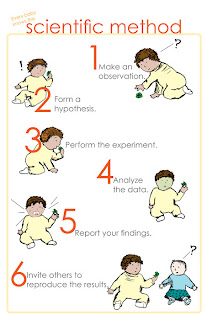In America we tend to think of science and religion as conflicting world views. This is, after-all, the land that still, despite wide-spread scientific consensus, wrangles with climate change denial. This is the land where my home-state passed an "academic freedom" bill because Missourians still can't reconcile Darwin and Genesis.
In the late 1800s, Scientist John William Draper proposed, "The history of Science is not a mere record of isolated discoveries; it is a narrative of the conflict of two contending powers, the expansive force of the human intellect on one side, and the compression arising from traditionary faith and human interests on the other." Though contemporary scientists denounce Draper's Conflict Thesis as overly simplistic, it remains a powerful force in popular culture. Adherents on either side of the supposed conflict glare scornfully into the opposing camp and lament the willful ignorance of the other. The media (both conservative and liberal) just heightens to problem by highlighting sensational non-news stories. Politicians exploit the divisive politics of stem-cell research, environmental regulation, and abortion to forward their own political agendas.
However, both history and modern science reveal the interconnectedness of science and religion. For example, during the Renaissance, believers across the social spectrum saw two paths toward understanding God. One was the Book of Scripture--the Bible. The other was the Book of Nature--scientific observation. Thus thinkers, scientists, and laymen alike believed that the more that science revealed about nature, the more they understood God's great work and purpose.
Modern pagans are a people without a Book of Scripture. There are undoubtedly books that have become foundational touch-stones of our faith. However our sprawling, eclectic religion is better conceptualized as interlocking circles rather than a list of tenants. One of those circles is idea of paganism as a nature-centric or earth-based spirituality. As Starhawk explains in The Earth Path, "The Goddess is embodied in the natural world, and science in its truest sense is about knowing nature. Thus our thealogy needs to be empirical as well as mystical." We are people of the second Book--the Book of Nature.
In Between Worlds I meditated on the strange balancing act between my witchy self and my academic self. As members of an Outsider community, it's easy to become skeptical and disenfranchised with seemingly authoritarian systems that leave minimal space for outlying perspectives. Many folks enter paganism to validate experiences and ideas that the mechanical/scientific world-view discredits: dreams, spirits who whisper through the leaves of trees, primeval stories, and nostalgic visions of a time before the industrial revolution.
In respect to all those folks who've been told that their beliefs are "scientifically impossible" and those who prefer poetry to statistics, I won't argue that all pagans should be scientists. Since we're working from a place of personal experience rather than academic consensus, we don't have to be completely methodical, rational, and objective. We have a unique space to embrace the best of both worlds.

To best explore those worlds, I believe pagans should study the Book of Nature as naturalists. Merriam Webster defines a naturalist as "a student of natural history; especially: a field biologist." I imagine a world where pagans spend less time sitting in living rooms talking about the four elements and more time mucking about outdoors. We can speak to a trees as "Sister-Dryad" for the mythical maidens who inhabit their branches or we can name them oak, silver maple, and sycamore. We can sing to the rippling waters and take the time to learn the creek's name and how it connects to our watershed.
Names hold power (thanks, Le Guin) and I've found that learning about nature,--the names, the cycles, etc.--increases my connection to this tapestry of life that I hold sacred. Knowledge reveals miracles. The Book of Nature both enchants and explains. Rather than getting caught up in the religion/science binary, I borrow the tools of science (primarily observation) to understand and illuminate my religion.




